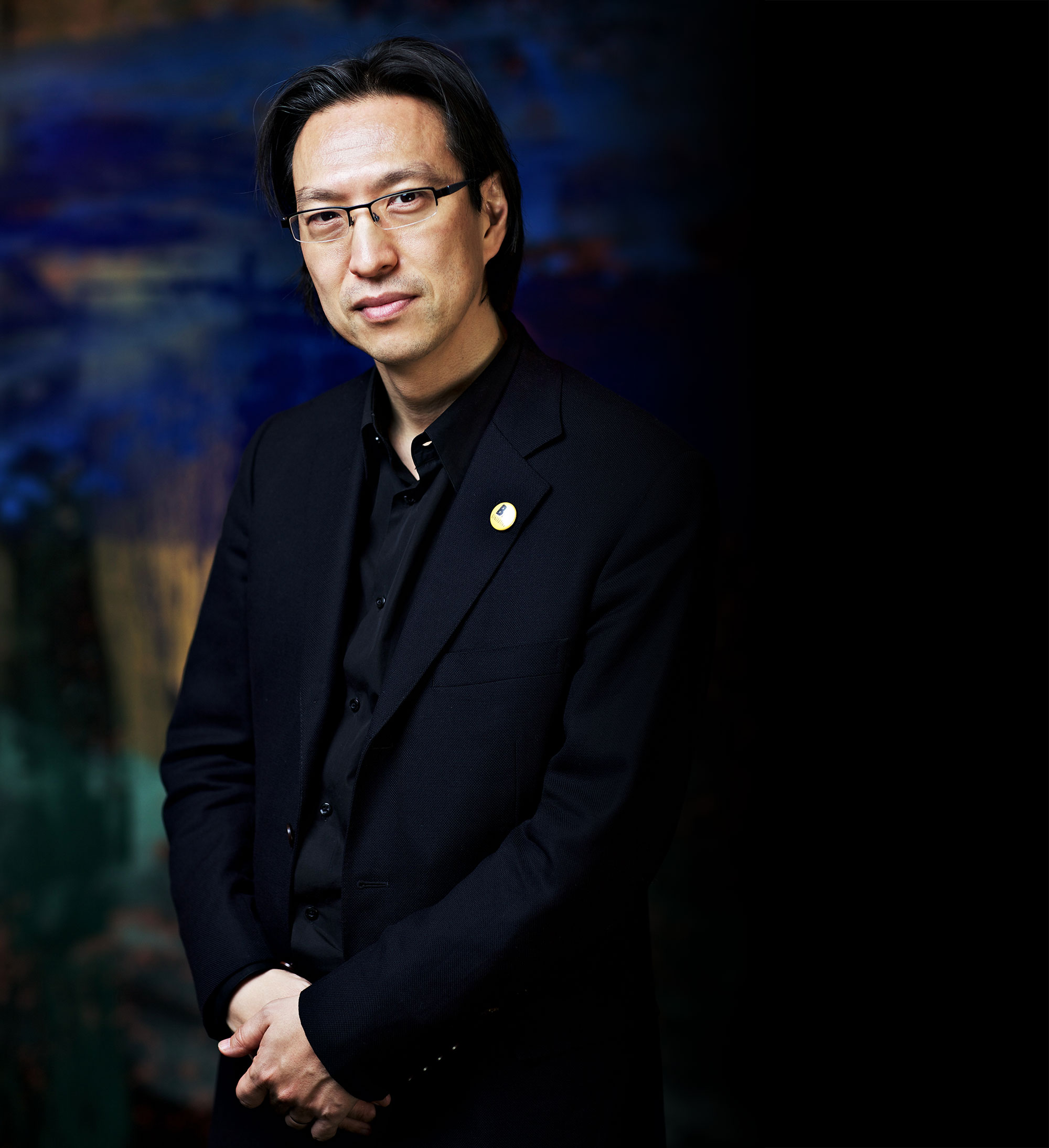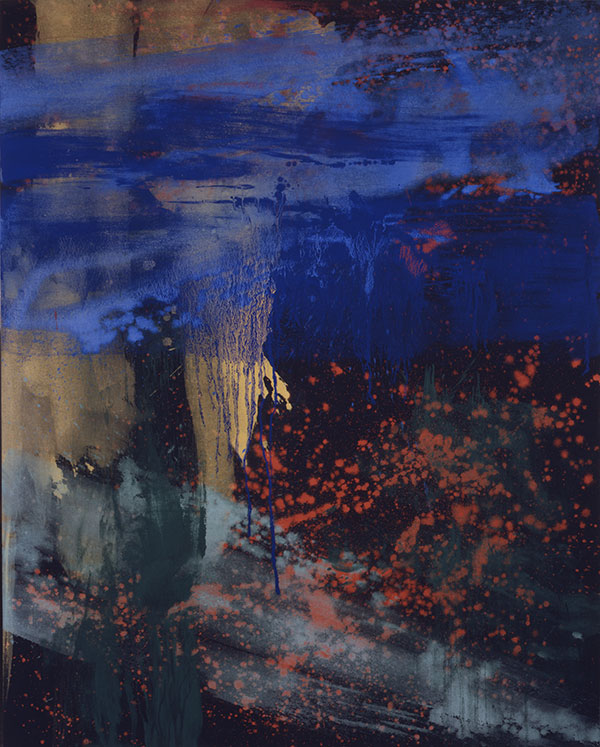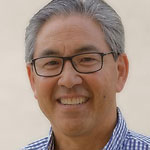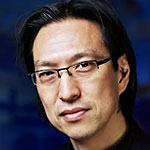
Artist Makoto Fujimura shares a few personal moments with the Rev. Dr. Ken Uyeda Fong as they discuss how unaccustomed we are to beauty and what happens when creativity meets faith.
KEN: Tell us now about your journey as an artist, as a painter.
MAKOTO: My father is a renowned scientist and my mother is an educator, so I grew up in this wonderful, nurturing home for creativity. I've never had my parents say, "Are you sure you want to be an artist?" The encouraged me, even from when I was just a young boy. They nurtured my ability to create, my ability to see things and have this discernment of what is truly good and beautiful. And really, that was part of my education growing up.
I was in Kamakura, the 12th century capital of Japan, and saw the most beautiful villages integrated with nature and culture, and everywhere you look, there is beauty. You're immersed in beauty. I grew up understanding that beauty is to be valued, and to create beauty was the greatest honor.
Looking back, I was very fortunate. I went to middle school and high school in the U.S. — in New Jersey — and I assumed that everyone felt the same way about beauty as I did.
KEN: Well, certainly not beauty everywhere you look in New Jersey.
MAKOTO: Although, New Jersey has its own beauty in a different way.
KEN: You're so kind.
MAKOTO: The idea that everybody has this aesthetic experience — that everybody has artistic expression, whether it's art, music, or theater — these were all things that were just a natural part of my life.
I was so fortunate to grow up in that kind of environment, a very creative environment. I went to college in Pennsylvania, a liberal arts college called Bucknell University. So when I went, I got to explore all sorts of different paths, sciences to arts.
Finally, I decided that I had to try to make a go at becoming an artist full time. I didn't know what that meant. I didn't know if that was even possible. But several experiences during that time convinced me that I should try ... (and) convince my fiancée that it would all be OK.
She wanted to marry a banker. So when I was telling her, "I'm going to be an artist!" she was like, "OK ... " I was graduating and I was so worried about making a living and supporting us, and I forgot the intrinsic value of creating beauty. But (my wife) was the one who actually remembered. Not only did she remember, but she was the one who practiced the daily act of bringing beauty into our lives.
So that was kind of my repentance. I wasn't a Christian then, but looking back, I think that actually opened a path for my spiritual journey. It was then that I realized that there was something greater than pragmatism and survival. And I had to believe that — I didn't have a paradigm for it, but I'm an artist; if I can't believe that, I can't be an artist.
KEN: So you're saying you can't be painting, hoping to be able to sell your pieces?
MAKOTO: Well, it's more like, "Is there anything in the world that is gratuitous, unnecessary? And because it's unnecessary, is it essential?"
KEN: OK. Unpack that.
MAKOTO: Basically, it's me being an artist. Most people think being an artist means you paint, you market that, you sell it, you make money. Well, that's not being an artist. Being an artist is realizing that beauty matters, and at the time, beauty was "out" in the art world. But truth matters. So if you were depicting something truthfully, it's not necessarily something that the world wants. There's a kind of prophetic ego at work in the life of every artist. He or she is totally committed to this and they will face starvation before they let that go — this is a true artist.
So now, pragmatism kicks in and you do have to pay rent. If you have family, you have to think about that side of the equation. But really, my thought was, "OK, so are we just machines or animals surviving in this Darwinian battle, or is there something more to life? And if I believe that there's something more to life, like beauty, then how do you account for that?"
The problem is, if you're an artist and if you're good, you're creating something that's extraordinary — a miracle that's happening in front of you — and you don't have a paradigm to justify that. So you become this self-destructive person, because you're always denying there's a gap between what you're making and who you are and what you believe inside.

This became very much accentuated when I went to Japan and had time to think, read, and explore all sort of things I had read before. I studied William Blake, Milton, and Shakespeare in college — so I knew that they had a biblical base. I had even studied the King James Bible and tried to find out what that was. I couldn't figure it out.
KEN: So this was before you were a Christian?
MAKOTO: Yeah, so at the time when I'm trying to be an artist, this struggle was going on about my inherent need and ability to create something beautiful, and the lack of my internal compass that would allow for that in my life. So artists are supposed to be despondent and in despair, this genius sitting in the corner ...
KEN: Cut your ear off ...
MAKOTO: Yeah, exactly. So that's the image. Actually, the postmodern paradigm doesn't explain that there's a way toward integration. So you're constantly caught in between, and you feel marginalized from everything. This is the plight of having that sensitivity.
But at the same time, I was very fortunate. Through my wife, I was introduced to this other paradigm that accounted for beauty. But it was through sacrifice — the greatest sacrifice of all, which was defined as this cosmic love being, invading us through Christ on the cross; this action of true, pure sacrifice liberating us from our bondage to decay; and this freedom that you gain — this beauty that you have is not only for the things you make, but for you. That God is looking at me with even more passion and commitment to make me beautiful as I make my paintings beautiful — I could understand that, and it was at that point that I realized I needed to surrender my life to Jesus, because He is the only way, He's the only paradigm that I know that allows for this integration to happen fully.
I tell my students all the time, "The way into beauty is to understand that God does not need us." And people are like, "Don't say that in the church. You'll get kicked out." And I say, "Well, I know. But I'm still an artist so I say things like this." God doesn't need us, there's no utility. He didn't need to create the universe. But He created us because He wanted to. Because He loved.
That's the nature of love — love is always creative and it goes beyond necessity and pragmatism and utility. Love creates in this generative way that you can't account for it. There's no paradigm other than a Christian paradigm that really harnesses this reality that creates this gratuitous, wasteful beauty that is actually essential for humanity, essential for worship, essential for understanding (the) actual Jesus, because He dwelt in that zone. He is the grand artist, and the Bible is a book — from the beginning to the end — a book about this artist God who created gratuitously, without any self-need to do so. He's completely self-sufficient, omniscient, but He chose to put into motion something that is so profound and beyond our comprehension, and we are but this product of God's beauty. Even though we are broken by the Fall, we are still to carry that DNA of that gratuitous beauty into the world. That totally made sense to me.
Now, I had a new mission. I could actually be an artist and claim that I worshipped an artist. That liberation helped me to free myself from my ego: It wasn't about me anymore but it was about God. I could worship. I could be a witness by simply being myself and simply creating beauty, and God will do the rest.
KEN: Now in your documentary that's on your website, one of your main teachers says something — and I don't think he's a Christian ... I was kind of floored by what he said. He said, "As an American, Mako, even though he was learning this ancient nihonga style of mixing the pigments and applying it, he always had an outsider perspective." So that didn't surprise me. "His art actually became better after he became a Christian." And he said, "I began to see kindness in it and gentleness and hope."
MAKOTO: (He) was my main professor who guided me to nihonga materials — an extraordinary artist himself and someone that I deeply, deeply respect — and we had many conversations when I was a graduate student. He was an assistant professor about faith issues, because I was going through it.
And he would always say, "Well, I'm not interested in Christianity per se, but I'm interested in the overlap" — and this and that, fine, fine, fine. So I was sitting there many years later, probably with guys who were asking him, "So what is it about ... is there anything that stands out to you, knowing Mako?" And he comes out with this.
I was just ... I couldn't believe it — because first of all, I didn't expect a Japanese professor to say anything about (faith) ... (or) touch the subject, period. Many interviews in that documentary are outside-of-the-church people. And they all shared what it meant for them to see my transformation. You can't see that. For a Japanese non-Christian to affirm my path, that they respected that, that they even saw how my work was being influenced and was becoming better and more clear — that was really moving.
KEN: Did you actually think you were doing that?
MAKOTO: It was like wrestling and trying to be as honest as you can about your journey. And I think I developed a sense that at this point, I really have nothing to lose. I've searched and searched and searched. I looked at all the world religions. I've been very diligent to know what it means to be a Buddhist. I even practiced Zen. I understood Hinduism. I didn't read the Quran at that point, but I thought I understood what it means to have religious regulations that guided us to be better people.
But what I encountered in the Gospel was none of that. It was such a clear revelation to me that I had nothing to lose. So when I painted, it was just this pure gift. I wasn't painting so my professors would be impressed by it, or have a show so the critics would be impressed by it. I mean, those are earthly ambitions that I do have as an artist, but that's not the ultimate bottom line. The bottom line for me is, "Can I be absolutely honest with myself and to the integrity of what I'm making to glorify God?" And that's all. If I fail, I'm covered by the blood of Christ. If I succeed, then it's only to give glory to God.
You can hear the rest of Ken’s interview with Makoto on Asian America Podcast, by visiting asianamericapodcast.com.

Ken Uyeda Fong grew up in Sacramento, CA and graduated with a bachelor’s degree from UC Berkeley. He completed his M.Div. degree in 1981 at Fuller Seminary, the same year he was called as the associate pastor of Evergreen Baptist Church of Los Angeles. He is also now the executive director of Fuller’s Asian American Initiative and assistant professor of Asian American church studies.

Makoto Fujimura, recently appointed director of Fuller’s Brehm Center, is an artist, writer, and speaker who is recognized worldwide as a cultural shaper. A presidential appointee to the National Council on the Arts from 2003-2009, Fujimura served as an international advocate for the arts, speaking with decision makers and advising governmental policies on the arts.